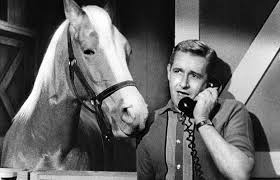Bonus Amicus: A Medieval Mr Ed? January 14, 2014
Author: Beach Combing | in : Medieval , trackbackOne of these cute medieval stories that may even have a factual basis.
There was a knight in Catalonia in our times, of very high birth, dashing in warfare, and gracious in manners, whose name was Guiraut de Cabrera. This man had a horse of outstanding quality, unrivalled in speed and – unprecedented marvel – full of sound advice in any distress! The nobleman gave this horse the name of Good Friend [Bonus Amicus]. It fed only on wheat-bread from a silver bowl, and it had a feather mattress to lie on. Whenever the noble gentlemen was hard-pressed in any difficult situation, he would have recourse to his horse, just as if he was asking the advice of a particularly discerning person. However, the words, signs or motions by which it made the answers understood remained unknown to people other than his master. This, though, was abundantly clear to all, even to his mortal enemies: acting on the advice of no one apart from his horse, he prospered in all his affairs. He could trick everyone and was himself tricked by none; no one could get the better of him, and he could either escape, when he wished, from a host of pursuers, or, amidst a rain of blows, put to flight those with whom he chose to do battle.
Erat temporibus notris in Cathalonia miles nobilissimis ortus natablibus, milicia strennus, elegantia gratiosus, cui nomen Giraldus de Cabreriis. Hic equum habebat in bonitate singularem, uelocitate inuincibilem et, quod sine exemplo mirandum fuit, in omnibus angustiis consilosum. Huic nobilis nomen indidit ut Bonus Amicus uocaretur; solo pane triticeo in conca uescebatur argentea, et culcitra de pluma pro substernio utebatur. Quociens artissimo quoquam negotio uir nobilis urgebatur, tamquam ad cuiusuis dissertissimi consilium, ad equum confugiebat. Verumtamen quibus uerbis quibusue signis aut motibus ad intellectum response formabat, hominibus preter dominum suum erat incognitum. Sed hoc apud omnes probatissimum fuit, etiam apud hostes capitales, quod nullius preter equum usus consilio, in omnibus prospere agebat; omnes eludens et a nullo elusus, a nemine uictus, et a multis persequentibus fugiebat dum uolebat, et inter crebros ictus fugabat quos eligebat ad pugnam.
Note that our author had some sorts of contact with Catalonia: so this account becomes half credible, or at least the perception of a wise horse does.
This knight was in the prime of life, charming, lively, highly skilled on musical instrument, and madly desired by the ladies. In our palace (which was restored to our possession by right of our wife’s inheritance through your generosity and kindness, most excellent Prince, by a ruling of the imperial court), in the presence of Alfonso of pious memory, the late renowned king of Aragon, and of our mother-in-law, who excelled among the ladies of her connection in her matchless repute, and in the sight of many other illustrious people, the knight of whom I have been speaking used to play the fiddle: the ladies led the dance, and at a touch of the strings the horse would join in with extraordinary capers.
Erat miles in iuuentute sua, iocundus, hylaris, musicis instrumentis plurimum instructus, a dominabus inuidiose desideratus. In palatio nostro (quod ex uestri munere uestraque gratia ad nos rediit per sententiam curie imperialis, princeps excellentissime, propter ius patrimoniale uxoris nostre), in presentia pie memorie Ildefonsi, illustris regis quondam Aragonensis, et socrus nostre, que singulari laude precellebat inter dominas sui confinii, necnon in conspectus multorum procerum, miles sepe dictus uiolam trahebat, domine chorum ducebant, et ad tactum cordarum equus incomparabilibus circumflexionibus saltabat.
Here is another of those stories that finishes badly. Remember for a medieval author anyone who bucks the natural order usually pays the price sooner or later.
Why go on? I do not know what to say. If it was a real horse, where did it get its sound judgement from, its intelligence, and its loyalty, which would have been remarkable qualities even in the wisest person? If it was a fay [fadus], as people say, or if the demons had a part in its nature, how did it eat? Well, in the end its master was killed by his squire, who had been bribed by Maximuminus – the squire was able to kill him because he had mounted another horse, while this one was having its blood let – and from then on it never took food, but died an awesome and wretched death by dashing its neck against the wall.
Quid plura? Quid dicam nescio. Si uerus equs fuit, unde in eo consilium, intelligentia, fidesque etiam in disertissimo admiranda? Si fadus erat, ut homines asserunt, aut genus quoddam mixtum demonibus, qualiter comedebat? Et at ultimum, perempto domino suo armigero suo, precio per Maximinum corrupto – eo quod, ipso flebotomato, alium equum acenderat – numquam post hec cibum sumpsit, sed ceruice ad parietem colisa, mirabiliter ac miserabiliter interiit.
So what was the trick or did the knight turn a horse with more than average character into a parlour trick? drbeachcombing AT yahoo DOT com



